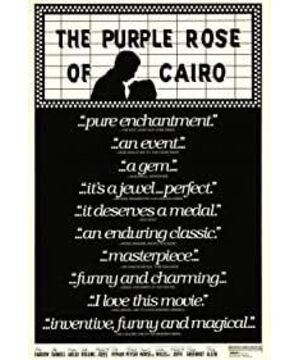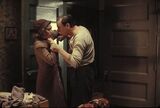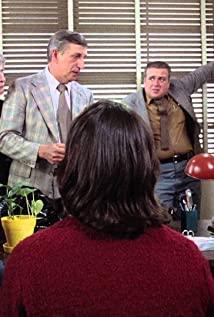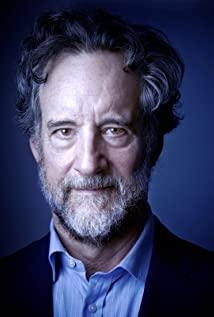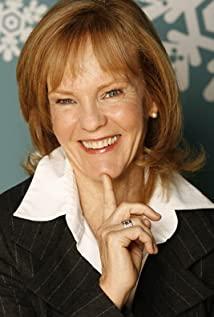A film in which black and white and color images alternate, the black part is film, fiction, and fantasy, and the color part is life, reality, and reality. Woody Allen's films have always had a kind of final effectism (the effect is on the end): shattering fantasy in a dreamy way - a tragic ending, creating a gap between reality and fantasy.
The film is no exception. The heroine Cecilia lives in the Great Depression era, has a dilapidated marriage, and the cinema is her only shelter. After her fifth movie "The Purple Rose of Cairo", the character Tom in the film On the screen, he came out to her, asked her name, and wooed her. Tom's actor Jill is a Hollywood star. Since Tom is a fictional character, he must send Tom back to the film, otherwise it may have consequences that are not conducive to his film and television career. Knowing that Tom and Cecilia are in love, longing for freedom and unwilling to return to the film, Jill wins Cecilia's heart for this. In the end, Cecilia chose the real Hollywood star Jill, and after Tom returned to the screen, Jill went to Hollywood alone without telling Cecilia. Cecilia was determined to leave her husband, packed her bags and went to the cinema to watch the withdrawn "Purple Rose of Cairo". After learning about Jill's whereabouts from passers-by, she went into the cinema and watched another movie, with tears in her eyes. Light focus.
Husband, Tom and Jill
"Okay, let's go, let's see how far you can go. Go, you won't be going for long, go and see what the real world looks like. Go, you'll be back, you're just bluffing, you're pretending, You'll be back. Maybe a week or an hour, but you'll be back."
- "Purple Rose of Cairo"
Husbands represent reality. He drank, gambled, lost his temper all day, and only gave Cecilia the status of a nanny, servant, or catharsis, not a wife of equal status. Cecilia tries to pack her suitcases and leave her husband when her husband is having an affair with the old woman, but returns to the family for fear of the cost of living alone. Her husband had long anticipated that she would not be able to escape from this turbid, messy family. Later, Cecilia was determined to leave her husband again after experiencing the decision of Tom and Jill, and her husband was still convinced that she would eventually return here - "Go, look at the outside, it's not a movie, it's real life , you'll be back, wait and see, you'll be back."
Tom represents fantasy. Tom, the fictional character in the movie "Purple Rose of Cairo" currently in theaters, emerges from the screen to seek Cecilia's love, and his personality is set to be brave, righteous and romantic. Tom took Cecilia to the screen to experience a free and happy life, and hoped that she and he would stay in the film forever. But Tom is too imaginary and perfect for Cecilia, a fantasy that has nothing to do with life. Just like the movie, it was her dream. The characters, scenes, dialogues, etc. in the movie made her break away from the suffocating life for a short time, but this dream will always end, and she will return to the fearful and trivial reality. A sane person would never think he was real.
Gill represents ideals. Jill is a Hollywood star, not as perfect as Tom, but a reality rather than a fictional person. Jill's love, talent and status all had a fatal attraction to Cecilia, making her forget one thing - Jill is an actor, she may just be an instrumental pawn, or she forgot another point - Jill and her Their lives are too different for the real possibility of being together. In the end, Jill abandoned Cecilia and went to Hollywood alone. Jill may have never liked her, and approaching her and courting her is just to send Tom back to the film; but it does not rule out that she has a true love while using her, and she has to give up her for the sake of her career. Cecilia thought she was in love with Jill and would go to Hollywood with Jill to live a glamorous new life, but her ideal was eventually destroyed by Jill. Jill seems to be real life, but another kind of dream - a more real dream.
Reality is the most real element, fantasy and ideal have dream elements, but it is a matter of degree.
The gap between reality and fantasy
"Fictional people want their lives to be real, and real people want their lives to be fictional."
- "Purple Rose of Cairo"
Real life is nothing but firewood, disease, contradictions, endless triviality and pain. The family is the representative of reality, and scenes of ridiculous dramas are staged within the family. The relatives let go of the usual moral disguise, and abandoned the illusion of harmony and happiness within the family that was deliberately displayed in front of outsiders, and began to habitually, endlessly, and heartily quarrels, lost their temper, and threw things. , raising the pitch, slamming the door and leaving... a depressing atmosphere. Selfishness and indifference are the norm, warmth is only presented on a few occasions, persistent warmth is nothing more than a moral disguise from the heart, even extremely boring, altruism is a longer and more shrewd egoist.
So everyone seeks dreams, unrestrained, incomparable pleasures. Movies are the representative of dreams. Movies create immersive dreamscapes for different objects, either comedy or tragedy. The wonderful and intense experience makes people indulge in it, and the sigh at the end of the curtain also means the end of the dream. Movies are always movies, fiction is full of perfect programming, even tragedies are drowning. Movies often cut out some trivial details in reality. Even if there are a lot of trivial details, the development of the plot can still beautify it, making the audience tremble and experience the legend of others.
Reality does not match fantasy. However, people often return to reality in the end, which is a rational and habitual thinking. Dreams can’t be maintained for a long time, and the cost of survival is all on the reality. I dare not and can’t go beyond reality to live as I think. If the so-called dream is realized inadvertently, the dream will be transformed into another reality, and then people will fall back into escapism. Therefore, reality and fantasy can never overlap for a long time, and there is an inevitable gap.
When readers read this article, they may also have an immersive, dreamy sense of pleasure. But the article is over, and he inevitably has to plunge back into real, trivial, annoying realities.
View more about The Purple Rose of Cairo reviews


